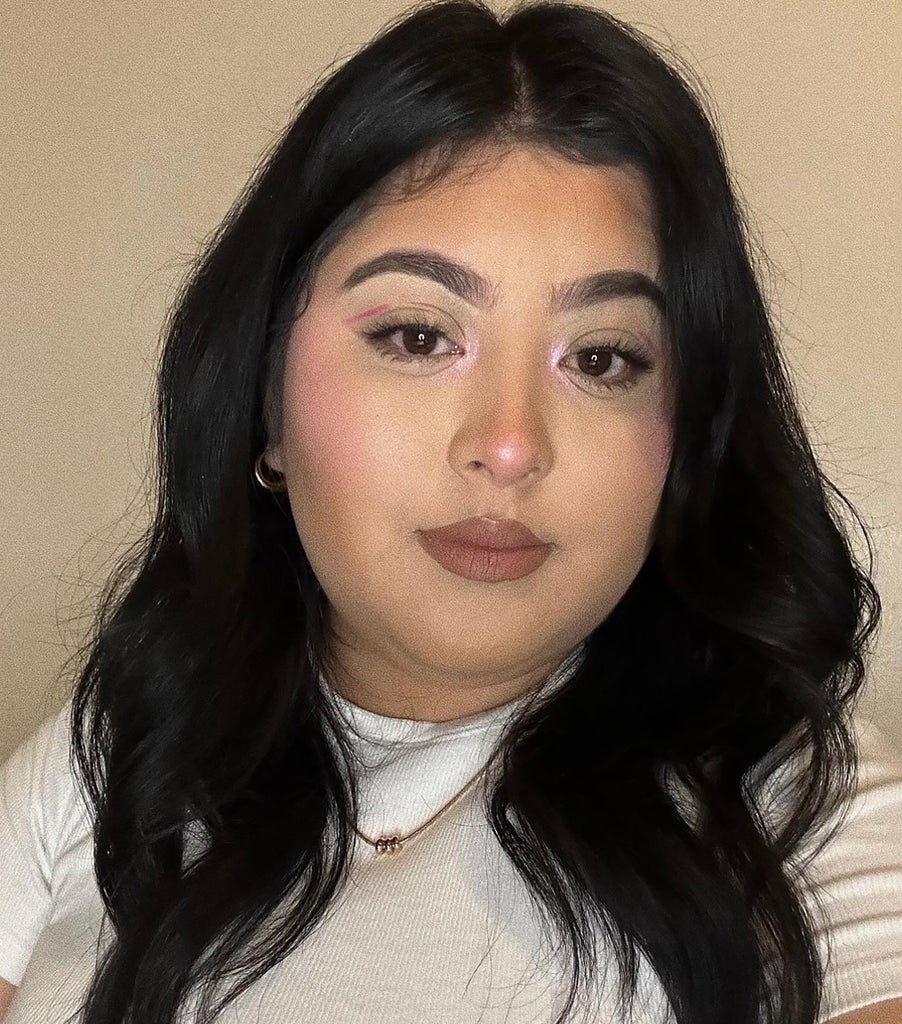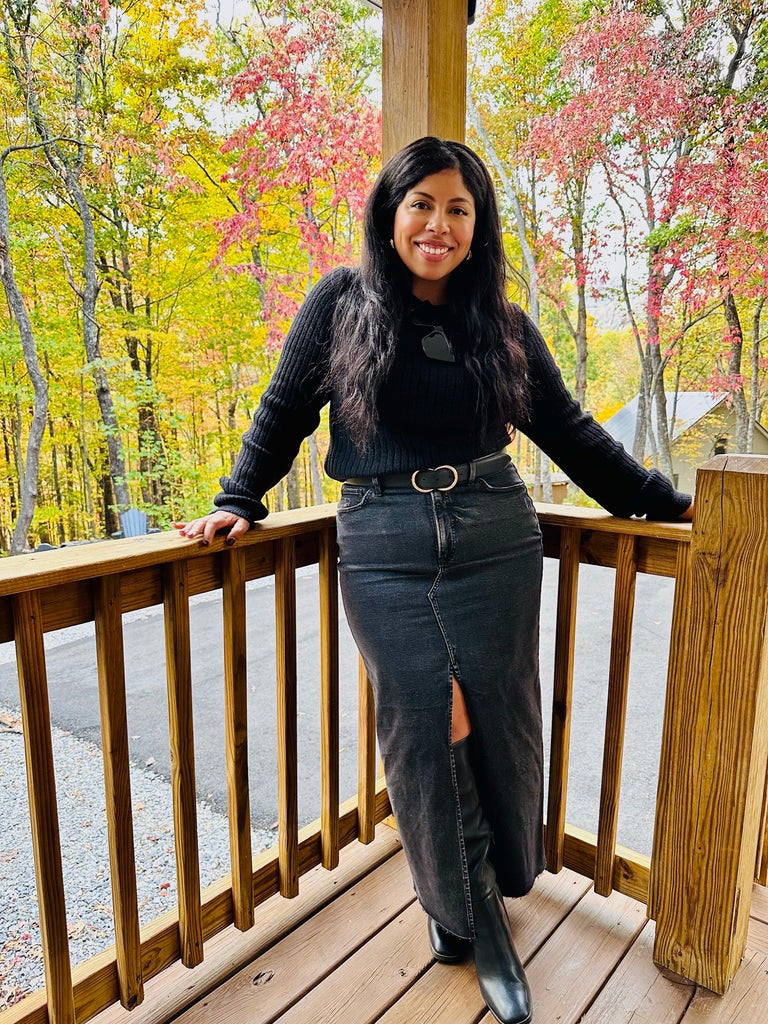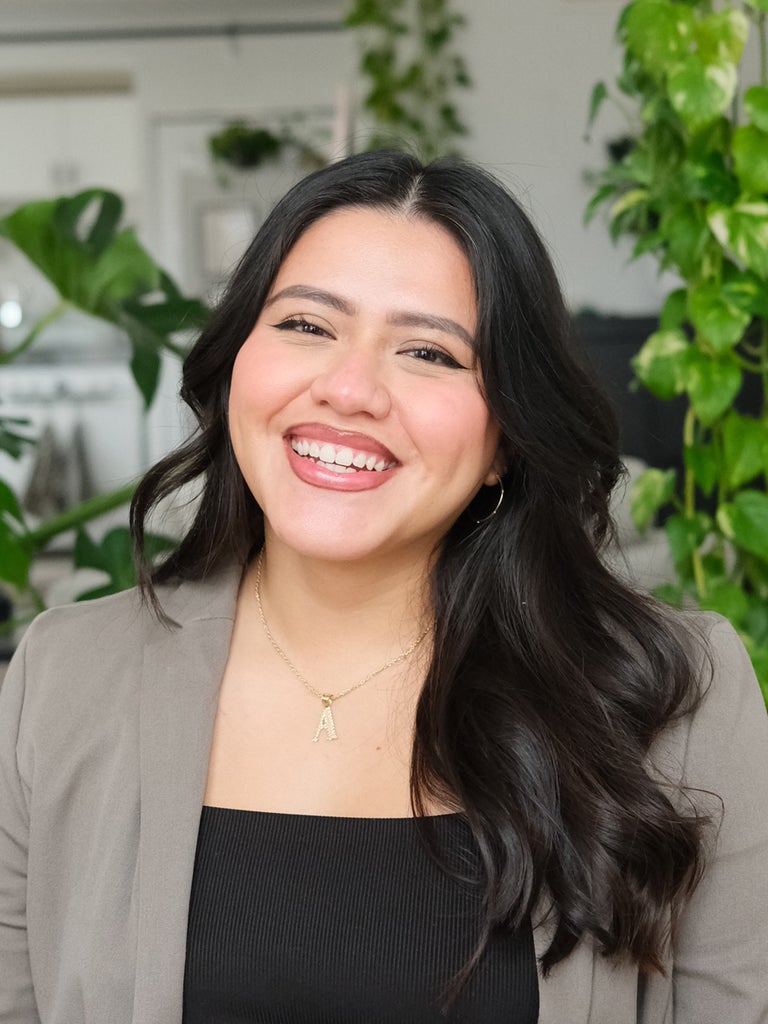The “Mi Hija Es Muy Independiente” TikTok Trend Helps First-Gen Latinas Feel Seen
It’s past midnight, and I’m mindlessly scrolling on TikTok. Just when I’m about to put my phone down and go to bed, I’m captivated by a simple video: a girl wiping her tears while looking in the mirror with overlaying text that reads, “Mi hija es muy independiente.” In English: My daughter is very independent.
I don’t know the TikToker, but I immediately understand the message she is conveying. I know her pain. I know the weight she is carrying, and I know how much she wishes she could let it go. In fact, I’m up late because I’m wrestling with my own troubles. I’ve been struggling to find work for months. I’m dealing with the emotions of a breakup. And I’m scared of losing the house I spent all my savings to buy. Yet when my mom calls and asks me how I’m doing, I say, “Estoy bien.” I can’t bear to burden her with the weight of stress on my shoulders. I’ll figure it out. I always have.
Children of immigrants are often tasked with being “independent,” even when we don’t want to be or when we shouldn’t be. Growing up in a culture that often remains foreign to our families, we navigate adult systems — like filling out paperwork to pay tickets, applying for government services, and making medical appointments — as children. Our parents often ask us for help in areas where many other children seek their parents’ advice. For daughters, especially Latinas, there are also cultural gender roles that instruct us that we must always give and never receive. As a result, there are generations of first-generation Latinas who have been taught to count on no one but ourselves, to support our families wholly while living our lives on our own, independently from the world.
“When my mom calls and asks me how I’m doing, I say, ‘Estoy bien.’ I can’t bear to burden her with the weight of stress on my shoulders. I’ll figure it out. I always have.”
kat lazo
As the eldest daughter to South American immigrant parents, this hyper independent character that was instilled in me since I was a child has always been a point of celebration for my parents. “Desde pequeña, la Katerine siempre ha sido muy independiente,” my mom often tells her friends.
@honeyles_ #carlamorrison #fypシ ♬ sonido original – OnlyMusic✔
According to Dr. Lisette Sanchez, a Southern California-based licensed psychologist who works primarily with first-generation immigrants, this experience is typical among children of immigrants. “It’s one of the most common experiences for the folks I work with,” Sanchez, herself the daughter of immigrants from Mexico and El Salvador, tells Refinery29 Somos. “I see this across other BIPOC cultures. I’m actively working with South Asian, multiracial, and Latina-identified people, and every person says they’ve experienced this. Men also experience it. The pressures and expectations just look a little different.”
“As the eldest daughter to South American immigrant parents, this hyper independent character that was instilled in me since I was a child has always been a point of celebration for my parents.”
kat lazo
When I clicked on the song used in the original TikTok video, “Hasta la piel” by Carla Morrison, I found hundreds of other Latinas who had joined in on the trend. For much of the night, I scrolled, seeing myself reflected in every video and eventually crying myself to sleep. It was powerful and cathartic to watch them artistically encapsulate feelings that I, at 33 years old, still wish I had better language to describe.
As the eldest daughter of immigrants, I often translated for my parents, both languages and cultures. And when the stress of being a new mom and adapting to a new country got to be too much for my mother, she defaulted to venting to me, a child, as her friend. She obviously didn’t know any better, and didn’t intend on causing any harm, but I still wrestle with how it affects me to this day: not knowing when I’m emotionally overwhelmed, over-extending my empathy for others at my own emotional detriment, and failing to believe others can help me.
“The experience that is happening is part of intergenerational trauma. What we’re witnessing is something called parentification, specifically emotional parentification, where a child is placed in charge of the emotions of the people immediately around them.”
dr. Lisette Sanchez
“The experience that is happening is part of intergenerational trauma,” Sanchez says. “What we’re witnessing is something called parentification, specifically emotional parentification, where a child is placed in charge of the emotions of the people immediately around them. We’re also witnessing our cultural value of marianismo, the expectation on women to feel pride in taking care of everyone, and lastly we’re witnessing the stigma toward mental health and asking for help.”
According to Sanchez, healing can come from recognizing that we, the children of immigrants, are not alone in these experiences. “It goes back to normalizing. Anything you can do that normalizes your experience, validates how you’re feeling. Finding the community that resonates best with you can give them a bit more insight into not feeling alone again,” she says.
With that, I spoke with some of the Latinas who participated in or felt seen by the “Mi Hija Es Muy Independiente” TikTok trend. Here, they discuss what it’s like to struggle in silence amid families that celebrate their so-called independence.
Leslie, 24, Mexican in Salinas, California

I made my video last month, when I was getting ready for a job interview. At the time, I was unemployed and struggling to pay my bills. I was applying everywhere and had finally landed an interview. I was filming a GRWM (get-ready-with-me) video for TikTok when I got the text message that my interview was canceled. I was so mad. I started taking my makeup off and broke down crying because I was so stressed out about how I was going to pay my bills. I didn’t expect it to go viral, honestly. In fact, I thought about deleting it because I didn’t want people to think I’m stupid for crying on social media. But the next morning, I woke up and saw it had more than a million views. I was like, what the hell just happened? I couldn’t believe how many of us are going through the same traumas.
When I tell my family I achieved something, they don’t know how much I struggled or cried for it or how hard I had to work. They just brush it off by saying, “Si es que eres muy independiente.” I don’t think these sayings are compliments. But maybe parents think they are.
“When I tell my family I achieved something, they don’t know how much I struggled or cried for it or how hard I had to work. They just brush it off by saying, ‘Si es que eres muy independiente.’ I don’t think these sayings are compliments. But maybe parents think they are.”
Leslie
I have four siblings; I’m the oldest one. My parents have always paid more attention to my younger siblings than to me. I try not to judge my mother because I know she went through a lot, too. But just because I’m the oldest doesn’t mean I don’t need my mom. I’m 24 years old, and I still need my mom. I still need her to give me guidance. I think they think we don’t need them because we’re so independent.
I wish my parents knew that I need their emotional support, especially now that I feel my depression and anxiety coming back. I was talking to my friend the other day and she told me, “You need to ask for help. Because if you don’t do it for yourself, no one else is going to do it.” And I think she’s right. At the end of the day, if I don’t take care of myself and I don’t put myself first, who’s going to do it? No one. So I started to talk to a therapist and we’re working on it, but it takes time. Como dice Karol G, “Mañana será bonito.”
Carmen, 35, Panamanian in Atlanta

My parents emigrated from Panama to North Carolina in 1990, when I was a year old. My mom, who didn’t speak English or drive, depended on my sister and me a lot. As children, we called tax professionals, government entities, and even just our local pizzeria. My father, who was able to do a bit more on his own because he drove, struggled with mental health and drug use. Amid all of this, I feel like we were pushed into adulthood a little bit earlier than we should have been.
Now, as an adult, I’m still helping them in old and new ways. My mom, who is 68, has arthritis, and it was making it difficult for her to work as a housekeeper. Unfortunately, partly due to my father’s drug use, my parents never saved for retirement. So I offered to take both of them into my house with my husband. And now, we’re fully supporting them.
“My family often calls me the independent daughter, but I don’t think they’ve taken the time to consider why I’m this way. They just think this is how I am; this is how I came out of the womb. But I’ve been forced to be this way; in many ways, it’s a fight-or-flight reaction.”
Carmen
My family often calls me the independent daughter, but I don’t think they’ve taken the time to consider why I’m this way. They just think this is how I am; this is how I came out of the womb. But I’ve been forced to be this way; in many ways, it’s a fight-or-flight reaction. In this sense, to me, being called the independent daughter is like a back-handed compliment. I had no choice but to be in that position as a child. And that kind of sucks, because so many of my peers were able to have a little bit more of a childhood. It’s sad that I wasn’t able to just be a normal kid who didn’t have to worry about the things that I worried about.
The “Mi Hija Es Muy Independiente” TikTok trend makes me feel less alone, and it also reminds us that we need more support for ourselves and for the other first-gen daughters.
Aidé, 20, Mexican in Chicago

I’m the oldest of three children. I’ve always been the child my parents don’t worry too much about. I’ve always done things by myself and figured things out by myself. I’m very resourceful. But it’s not because I chose to be resourceful. It’s because I learned that I needed to be like this. So for me, I don’t consider being the “independent daughter” a compliment. I think it’s a perception that my family has had of me that I internalized.
“I don’t consider being the ‘independent daughter’ a compliment. I think it’s a perception that my family has had of me that I internalized.”
Aidé
I learned at a young age that I need to learn how to do things on my own because my parents can’t help me. Once I got to second grade, my mom could no longer assist me with school work. She tried her best, but she couldn’t tangibly help me because she didn’t understand English. I remember she asked our neighbor if her son could come over to help, and I immediately felt like I didn’t want to be a burden to anyone. I didn’t want somebody to come help me because I wasn’t their responsibility. So I did everything on my own. Now, something my parents often say is, “Mi hija nunca me ha dado problemas. Ella siempre hace sus cosas solita.”
This has made it harder for me to ask for help when I need it. I’ve gotten better. I do ask for help when it’s work-related, but I still don’t ask for help when I need to talk things through. Like if something bothers me, I don’t ask for somebody to hear me out.
@gradconmigo Oldest daughter here, just wanting to take a backseat now #fyp #hijamayor #independiente ♬ sonido original – OnlyMusic✔
Meanwhile, while I haven’t lived with my parents for the past three years, I’m still the person they always call on for help. Even though my brothers still live at home and are capable of helping, my parents still call me to do things for them. They call me to look up information online, pay bills, call people, and print things for them.
I wish I could tell my parents that I’m tired. I’m tired and I don’t want to do this anymore. I’m tired of being the go-to person to figure things out for other people. I never want to portray my family negatively. I think our parents grew up in a different generation, in a different country where they learned a lot of things that they couldn’t figure out how to unlearn. I always try to give them grace because they’re learning how to be parents for the first time, just like I’m learning to be me for the first time. I thank them for a lot of things that they’ve done for me, but I think with that there can still be a form of accountability, of allowing myself to feel frustrated and angry. That’s totally acceptable. I think both things can coexist.
Like what you see? How about some more R29 goodness, right here?
Source link
